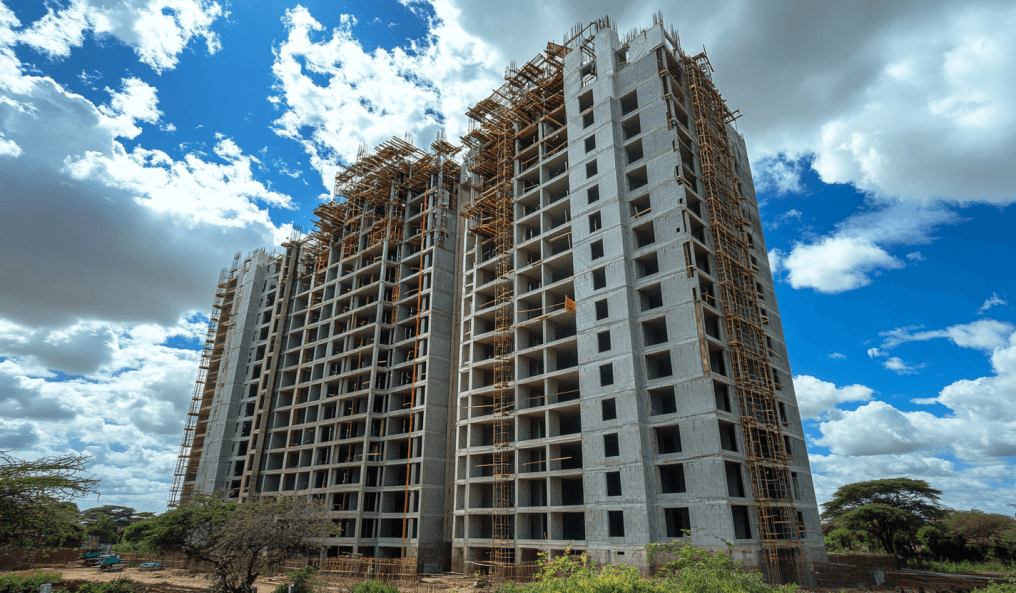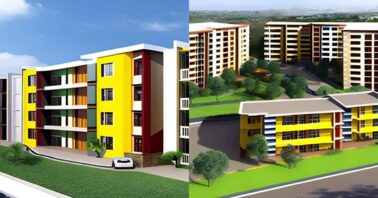This is the first of a two-part series seeking to demystify sectional title ownership in Kenya. The enactment of the Sectional Properties Act, 2020 raised questions among real estate developers, prospective buyers and financiers. These questions centre around how to create and obtain a sectional title.
This article explores the general aspects of sectional title ownership and how this differs from the previous framework.
Table of Contents
What is a Sectional Title?
A sectional title describes a property tenure where a person can have individual ownership of a unit within a development. Sectional titles can be for apartment, flat, maisonette, townhouse or office units.
The ownership of such a unit also includes ownership of a share of the common property with other unit owners in the building or development. In a residential estate, a homeowner will exclusively own their apartment and jointly own the compound or driveways in the estate with the other homeowners in undivided shares
READ ALSO: How to Get Sectional Titles for Properties in Kenya

Can one Hold a Sectional Title in Kenya?
Yes, the Sectional Properties Act of Kenya, 2020 provides a means for units in buildings to be owned by individuals. The legislation also provides for ownership of common areas and the use and management of common areas.
With the passing of the Sectional Properties Regulations, 2021, it is now possible to process a sectional title and hold it in your name.
The Sectional properties Act applies similarly for both foreign nationals and Kenyan citizens. The exception being that foreign nationals can only hold leasehold sectional titles for up to 99 years. Kenyan citizens can hold both leasehold sectional titles and freehold sectional titles. The Act provides that one can hold the title for more than 99 years.
READ ALSO: The Benefits of a Title Deed for Your Property in Kenya
How does the Sectional Properties Act, 2020 Differ From Past Unit Ownership Regimes in Kenya
Previously, the structure for ownership of units or apartments in Kenya has been through sub-leases (we can refer to this as the “Management Company Framework”).
Under the Management Company Framework, a developer would buy a piece of land and erect a block of flats. He would then form a management company under the Companies Act of Kenya. He would sell the units or apartments to purchasers through sub-leases of 99 years. With each unit sold, he would allot the buyer or homeowner a share in the management company. After all apartment units were sold, he would transfer the land on which the block of flats was erected to the management company. Ideally by this time, all purchasers would be shareholders in the management company. Therefore, they would be the beneficial owners of the land on which their homes were erected (title to this land is commonly called the “Mother Title”).
Since the homeowners were holding sub-leases, they were dependent on the Mother Title which was held by either the developer or the management company. Their sub-leases were borne from the Mother Title and could not exist independently of the Mother Title.
Problems With the Past Regime
- At times a developer would not issue shares in the management company to the purchasers of units in his development. This meant that the developer retained ultimate control of the development. This also means that they could at any time threaten to terminate their sub-leases.
- A developer would sometimes refuse to exit the management company once all the units are sold and continue to collect service charges set to very high rates without consulting the unit owners.
- Because the sub-leases are usually set to 99 years, a developer would at times forget to include a renewal clause in the sub-lease. Even where such a renewal clause was included, a developer would fail to renew the sublease under the Mother Title and this would result in the homeowner’s title being in jeopardy. There are instances where the company that owns the Mother Title is erroneously wound up leaving a homeowner unable to renew their sub-lease on expiry.
- Developers who took loans to complete construction would sometimes fail to discharge the units or apartments sold from the banks. Where a unit is not discharged from the bank, innocent buyers are vulnerable to repossession of the unit where the developer defaults on his loan to the bank.
The Government of Kenya had in the late 80’s enacted sectional titles legislation. The Sectional Properties Act of 1987 did not take off because it was based on the now repealed Registered Lands Act (RLA). Titles had to be converted to RLA titles at significant cost before one could process section titles under the 1987 Act. As a result, a lot of developers often opted for the Management Company Framework.
How the New Act Cures Previous Issues

- Introduces sectional titles registrable for freeholds properties or leaseholds of over 21 years regardless of the nature of the title.
- Establishes a corporation which comprises all homeowners of units within an estate development. The corporation’s core mandate is to take care of the common areas of the Estate. The parking bays, walkways, garden areas, playgrounds and so forth. The advantage of the corporation is that it is not a company under the Companies Act. There are no filing fees or incorporation costs payable for its set up. Also unit owners automatically become members by owning the unit. The developer doesn’t have to allot shares to them.
- It established a dispute resolution committee that determines disputes with the development between unit owners. This makes it cheaper and easier to resolve disputes.
FAQ
A sectional title describes a property tenure where a person can have individual ownership of a unit within a development. Sectional titles can be for apartments, flats, maisonettes, townhouses, or office units.
1. Freehold
2. Leasehold
3. Community ownership
A freehold title provides absolute ownership of the piece of land. This means that the individual owns the land for a lifetime unless they sell it.
We hope this content has been useful to you.
In our next blog post, we will look at the steps to acquiring a sectional title. We will also look at the consequences of not having one and the fate of existing sub-leases. There is a deadline for conversion of sub-leases to sectional titles so come back for part two to understand how be compliant.
Are you are a developer or homeowner looking to understand the sectional titles regime in Kenya? Do you want to undertake conversion of your sub-leases to sectional titles? Please reach out to Divinah Ongaki (d.ongaki@agema-analysts.com) or Elizabeth Omol (e.omol@agema-analysts.com).
The author is Diviniah Ongaki, a Senior Counsel at Agema Analysts. She has over 8 years experience in Real Estate and Conveyancing Law.



